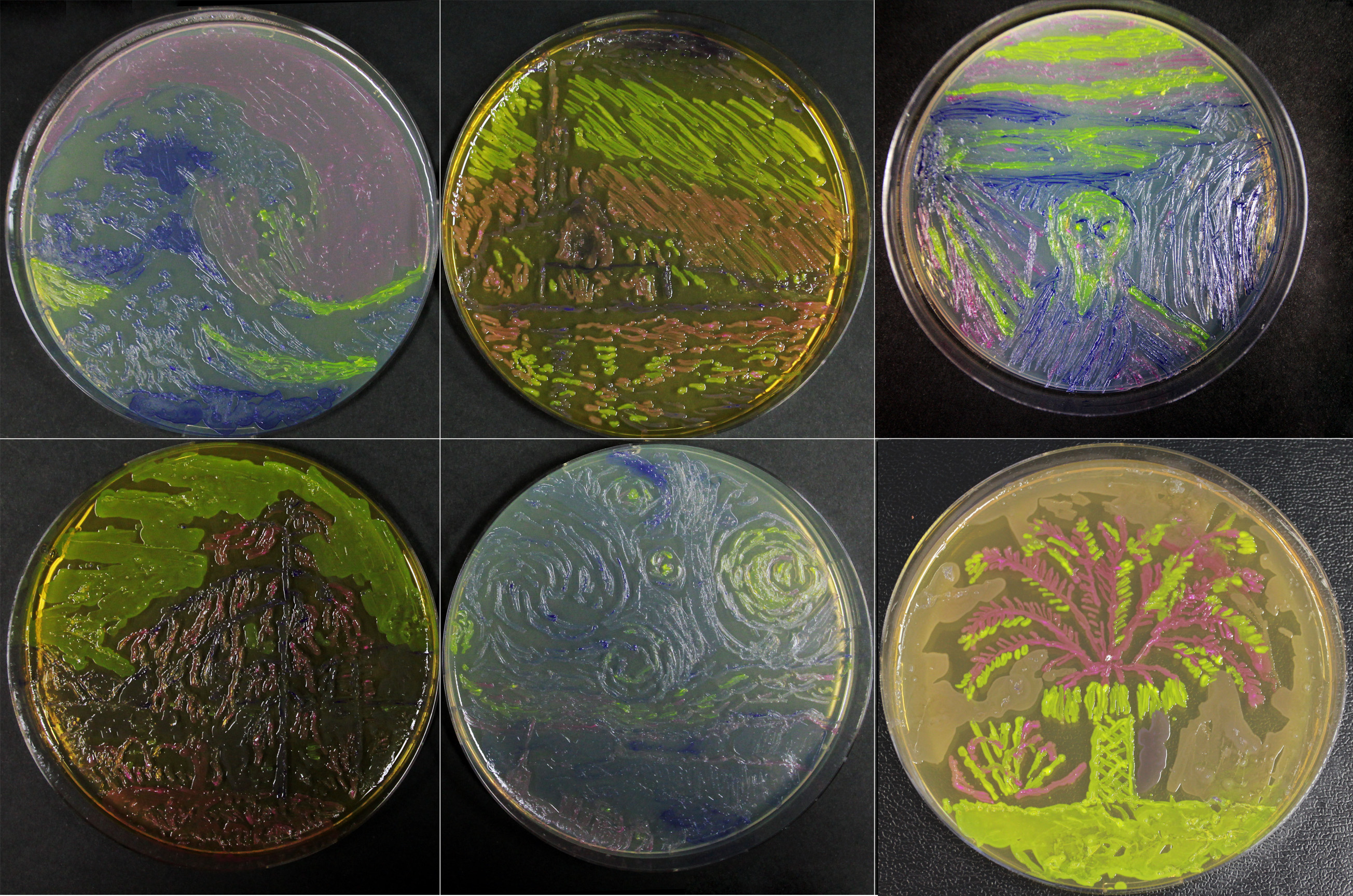Difference between revisions of "Part:BBa K1149020"
| (22 intermediate revisions by 2 users not shown) | |||
| Line 2: | Line 2: | ||
<partinfo>BBa_K1149020 short</partinfo> | <partinfo>BBa_K1149020 short</partinfo> | ||
| − | The chromoprotein from the coral Acropora millepora, amilCP, naturally exhibits strong | + | <h2>Introduction</h2> |
| + | |||
| + | The chromoprotein from the coral Acropora millepora, amilCP, naturally exhibits strong colour when expressed. The protein has an absorbance maximum at 588 nm giving it a blue/purple color visible to the naked eye, thereby requiring no instruments to observe. | ||
This is a composite part from [https://parts.igem.org/Part:BBa_K608002 BBa_K608002] and [https://parts.igem.org/Part:BBa_K592009 BBa_K592009]. It is functionally similar to [https://parts.igem.org/Part:BBa_K592031 BBa_K592031] which has a J23101 promoter instead of the J23104 but contains the same RBS and amilCP. | This is a composite part from [https://parts.igem.org/Part:BBa_K608002 BBa_K608002] and [https://parts.igem.org/Part:BBa_K592009 BBa_K592009]. It is functionally similar to [https://parts.igem.org/Part:BBa_K592031 BBa_K592031] which has a J23101 promoter instead of the J23104 but contains the same RBS and amilCP. | ||
| − | + | <h2>Future applications for this part</h2> | |
| + | |||
| + | We originally designed this part to serve as a positive control for our secretion tag toolkit. If amilCP is successfully secreted then the supernatant should remain blue in colouration post-centrifugation. | ||
| + | |||
| + | <h2>Qualitative characterisation</h2> | ||
| + | |||
| + | <div class="imgbox" style="width:300px;"> | ||
https://static.igem.org/mediawiki/igem.org/7/7d/LigationamilCPICL.JPG | https://static.igem.org/mediawiki/igem.org/7/7d/LigationamilCPICL.JPG | ||
| + | <p style="text-align:right;"><i>Figure: amilCP ligation cloned into E. coli strain NEB 10. The blue coloration made it very easy to select the ligations with the insert from the transformation plate:</i></p> | ||
| + | </div> | ||
| + | |||
| + | |||
| + | <div class="imgbox" style="width:300px;">https://static.igem.org/mediawiki/igem.org/f/f5/AmilCP_cultureICL.jpg | ||
| + | <p style="text-align:right;"><i>Figure: amilCP overnight cultures before and after centrifugation. Blue amilCP expressing cell pellets can be seen post centrifugation.</i></p> | ||
| + | </div> | ||
| + | |||
| + | <h2>We were inspired by the beautiful blue coral colour and taught the bacteria how to write our name with it.</h2> | ||
| + | |||
| + | <div class="imgbox" style="width:300px;">https://static.igem.org/mediawiki/igem.org/f/fb/PlasticityBluePlate.JPG | ||
| + | <p style="text-align:right;"><i>Figure: Made from streaking overnight cultures of amilCP transformed MG1655</i></p> | ||
| + | </div> | ||
| + | |||
| + | |||
| + | <h2>Novel method of painting with highly cultured E. coli.</h2> | ||
| + | |||
| + | In addition to this, we have shown that bacterial paintings are achievable with this amazing biobrick (blue). These paintings were created for human practices purposes, to communicate the wondrous potential and inspiring beauty of synthetic biology. Our paintings were submitted to a SynART exhibition in collaboration with | ||
| − | + | [[File:Originals_combined_small.jpg|600px|Figure: Blue colouration relates to amilCP transformed MG1655]] | |
| − | + | ||
| − | |||
| − | |||
| − | We have | + | <b>Note:</b> We have verified the sequence and detected 3 mutations compared to the expected results. However, these are located after the prefix and at the scar site and do not affect the coding region or the function of the construct. |
| − | |||
| − | |||
<!-- Add more about the biology of this part here | <!-- Add more about the biology of this part here | ||
Latest revision as of 13:01, 3 October 2013
Promoter J23104 - RBS B0034 - amilCP
Introduction
The chromoprotein from the coral Acropora millepora, amilCP, naturally exhibits strong colour when expressed. The protein has an absorbance maximum at 588 nm giving it a blue/purple color visible to the naked eye, thereby requiring no instruments to observe. This is a composite part from BBa_K608002 and BBa_K592009. It is functionally similar to BBa_K592031 which has a J23101 promoter instead of the J23104 but contains the same RBS and amilCP.
Future applications for this part
We originally designed this part to serve as a positive control for our secretion tag toolkit. If amilCP is successfully secreted then the supernatant should remain blue in colouration post-centrifugation.
Qualitative characterisation

Figure: amilCP ligation cloned into E. coli strain NEB 10. The blue coloration made it very easy to select the ligations with the insert from the transformation plate:

Figure: amilCP overnight cultures before and after centrifugation. Blue amilCP expressing cell pellets can be seen post centrifugation.
We were inspired by the beautiful blue coral colour and taught the bacteria how to write our name with it.

Figure: Made from streaking overnight cultures of amilCP transformed MG1655
Novel method of painting with highly cultured E. coli.
In addition to this, we have shown that bacterial paintings are achievable with this amazing biobrick (blue). These paintings were created for human practices purposes, to communicate the wondrous potential and inspiring beauty of synthetic biology. Our paintings were submitted to a SynART exhibition in collaboration with
Note: We have verified the sequence and detected 3 mutations compared to the expected results. However, these are located after the prefix and at the scar site and do not affect the coding region or the function of the construct.
Sequence and Features
- 10COMPATIBLE WITH RFC[10]
- 12INCOMPATIBLE WITH RFC[12]Illegal NheI site found at 7
Illegal NheI site found at 30 - 21COMPATIBLE WITH RFC[21]
- 23COMPATIBLE WITH RFC[23]
- 25COMPATIBLE WITH RFC[25]
- 1000COMPATIBLE WITH RFC[1000]

